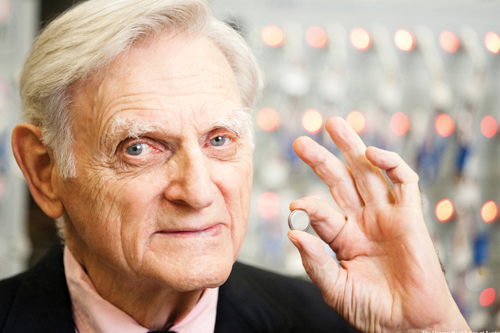
John B. Goodenough, professor in the Cockrell School of Engineering at The University of Texas at Austin, has been awarded the 2019 Nobel Prize in chemistry—jointly with Stanley Whittingham of the State University of New York at Binghamton and Akira Yoshino of Meijo University—“for the development of lithium-ion batteries.”
In the words of the Nobel Foundation, “Through their work, they have created the right conditions for a wireless and fossil fuel-free society, and so brought the greatest benefit to humankind.”
Goodenough, who was born in 1922, identified and developed the critical materials that provided the high-energy density needed to power portable electronics, initiating the wireless revolution. Today, batteries incorporating Goodenough’s cathode materials are used worldwide for mobile phones, power tools, laptops, tablets and other wireless devices, as well as electric and hybrid vehicles.
“Billions of people around the world benefit every day from John’s innovations,” said Gregory L. Fenves, president of The University of Texas at Austin and former dean of the Cockrell School. “In addition to being a world-class inventor, he’s an outstanding teacher, mentor and researcher. We are grateful for John’s three decades of contributions to UT Austin’s mission.”

